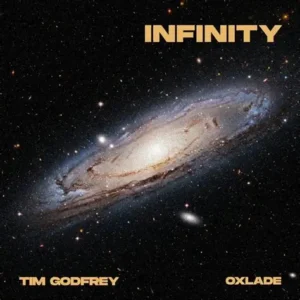Tim Godfrey x Oxlade’s “Infinity” and the Gospel Secular Crossroads of Nigerian Music
Release date: October 2025
Artists: Tim Godfrey & Oxlade
Produced by: SMJ
Label: Rox Nation
Genre: Gospel / Afrobeats Fusion
When Tim Godfrey one of Nigeria’s most celebrated gospel voices announced a collaboration with Oxlade, many fans expected a remix, not a revelation. Instead, “Infinity” arrived as a bright, soulful track that blurs every line we thought separated the sacred from the secular. The internet reacted instantly. Some hailed it as a divine experiment; others called it compromise. But one thing is certain: the conversation around “Infinity” is bigger than the song itself.
A Collaboration That Feels Like a Cultural Earthquake
Tim Godfrey’s name carries weight in the gospel world. With anthems like “Nara” and “Toya”, he built a reputation for uniting African worship with global sound. Oxlade, meanwhile, is the face of modern Afrobeats sensuality expressive, emotional, and defiantly mainstream. Their partnership feels like two musical planets colliding.
But in the collision, something new emerges: a song that dares to suggest that worship can exist in rhythm, that praise doesn’t need to sound “holy” to be sacred.
Musically, “Infinity” is smooth Afrobeats percussion, mellow bass, and a hook that flows more like an R&B confession than a Sunday service chorus. The lyrics stay grounded in gratitude and grace, but the delivery the warmth in Oxlade’s tone, the groove of the beat gives it universal appeal. It’s a gospel message dressed in Afrobeats silk.
The Backlash: Sacred vs. Secular Lines Redrawn
Almost immediately after its release, social media lit up. Gospel purists accused Tim Godfrey of “polluting worship” by inviting a secular artist into sacred space. Twitter threads framed the song as a symptom of moral decay; church groups debated whether gospel music was losing its direction.
But younger listeners and many creatives saw it differently. For them, “Infinity” felt like liberation. A declaration that faith doesn’t have to live behind stained glass. One fan on X wrote:
“If Oxlade can sing about God, maybe we’re finally breaking the religious gatekeeping that’s held music hostage.”
That quote captures the heart of the cultural tension: for Gen Z Nigerians, spirituality is becoming less about genre and more about authenticity. They see no contradiction between loving KU LO SA and singing “Nara” in church. Faith and rhythm are no longer rivals they’re companions.
Oxlade’s Role: A Symbol of Inclusion, Not Invasion
Oxlade’s participation is what turned “Infinity” from a collaboration into a conversation. His voice, usually associated with intimacy and emotion, carries unexpected reverence here. He doesn’t overshadow Tim Godfrey; he complements him grounding the song in humility and heart.
In a culture where gospel and secular artists rarely share space, his inclusion signals something radical: that maybe the divine isn’t confined to genre labels. Oxlade doesn’t bring worldliness into gospel he brings humanity.
And that’s what critics miss. The power of “Infinity” isn’t in theological precision; it’s in spiritual openness. It’s music that invites everyone in, whether you’re singing in church pews or from the back seat of a Lagos Uber.
The Sound of Gospel’s Next Evolution
What Tim Godfrey has done here echoes what Kirk Franklin did for American gospel in the ’90s merging the sacred with the street. But in Nigeria, that experiment carries heavier cultural baggage. Religion here isn’t just belief; it’s identity, morality, and belonging.
That’s why “Infinity” hits a nerve. It suggests that gospel can sound like Afrobeats, the same genre that powers clubs and parties. Yet beneath the beat, the message stays the same: gratitude, hope, divinity.
The production, led by SMJ, blends Godfrey’s traditional choir arrangements with Oxlade’s R&B sensibility a sonic handshake between worship and vibe. It’s clean, warm, and modern the kind of track that could play at both a youth conference and a rooftop brunch without feeling out of place.
Faith, Authenticity, and the Politics of Sound
At its core, the controversy around “Infinity” reveals a deeper anxiety in Nigeria’s creative space: who gets to define holiness?
Older audiences tend to equate sanctity with form the organ, the choir robe, the reverent tone. Younger ones equate it with intent sincerity, energy, connection. “Infinity” bridges those worlds by speaking a spiritual truth in a contemporary language.
And that’s exactly what makes it disruptive. It challenges the idea that gospel should remain sonically conservative to be spiritually valid. As one critic noted:
“Maybe God isn’t offended by drums maybe He’s just waiting for better rhythm.”
This isn’t about rebellion. It’s about contextualizing faith in culture. In a generation fluent in Spotify playlists and TikTok trends, gospel has to adapt or risk irrelevance. Tim Godfrey’s collaboration with Oxlade isn’t a betrayal of tradition it’s an act of translation.
The Bigger Picture: Breaking the Binary
What’s happening around “Infinity” mirrors a global trend. In the West, artists like Chance the Rapper, Kanye West, and Maverick City Music have already blurred the gospel secular divide. Nigeria is just now having that conversation on its own terms.
If “Infinity” teaches us anything, it’s that spiritual music doesn’t need to fit into old boxes. It can move hips and hearts at the same time. It can be holy and vibey, sacred and stylish.
“Infinity” is more than a song it’s a statement. It dares to imagine a world where the sacred and the secular can harmonize without one corrupting the other. Tim Godfrey has always been a visionary in gospel music, but with Oxlade by his side, he’s started something that feels like a reformation.
The controversy may fade, but the question “Infinity” raises will linger:
Can gospel grow without losing its soul?
If this collaboration is any clue, the answer isn’t just yes, it’s already happening.




Leave a Reply